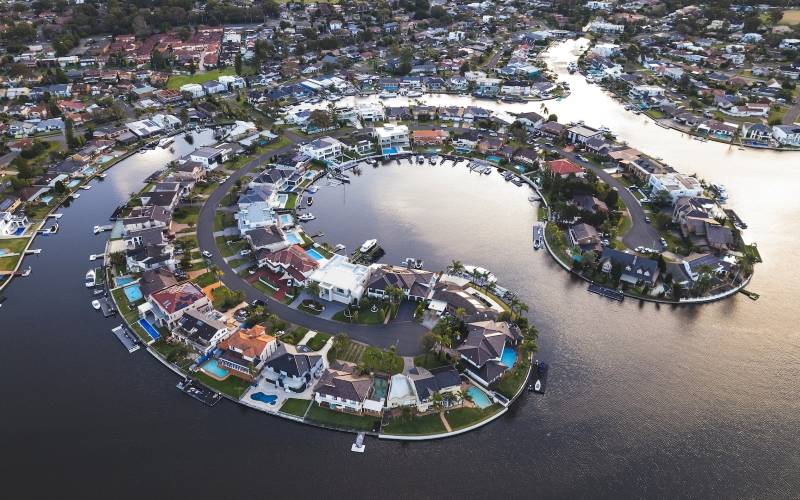Back when Dr Philip Lowe was governor of the RBA, he copped flak for saying rising housing costs - partly driven by interest rate rises - naturally caused a change in behaviours in the rental market.
For example, people are giving up their home offices for housemates, moving into share houses, delaying fleeing the family nest, and so on.
And a similar shift is being seen in the property investment sector.
Lloyd Edge, director of national buyers agency Aus Property Professionals (pictured above), told the Savings Tip Jar podcast property investors are getting smarter with how they make a buck. Here are a few examples.
1. Chasing yield and positive cash flow
Interest rate rises bear a heavy weight on the bottom line of many investors, hampering cashflow. This is especially the case if they are leveraged with two or more mortgages.
That, and 30-year high inflation levels have made the cost of living soar. In previous years investors might have sacrificed cashflow and rental yield for the longer term pay off of capital gains. However for some, that is changing.
“People are really looking for ways to try to get ahead at the moment, which is a little bit more than your normal buy-and-hold scenario,” Mr Edge said.
"I think a lot of it does have to do with the cost of living … investors don't really want to spend all their money on a property and then have it negatively geared, so they want to have a property that they feel they're still getting ahead with.”
One way people are doing this is looking at investment opportunities in regional areas, especially larger hubs.
“People are looking to some of those regional areas - country towns that do have a bit going for them such as Orange or Albury-Wodonga - because they also have strong yields,” Mr Edge said.
“I think people are hedging their bets a bit to buy something that already has good cash flow. So even if it doesn't get great growth, they know they’re getting some money back in their pockets.”
2. Holiday homes and part-time rentals
A lot of investors have consolidated their portfolio to now have a dual-purpose property - one for their holidays as well as for letting out on sites like Airbnb. And again the aim is cash flow.
“I've actually had a lot of requests from people to help them get into the Airbnb-type market, because it seems to have higher cash flow,” Mr Edge said.
“Whether it does or not is obviously something that needs to be worked out because the property isn't necessarily tenanted the whole year round.
“I bought my own first Airbnb property just last year, which I've been renting out. And it's also been doubling as our holiday home.”
… But tax reform could put a stop to that
Victoria recently introduced a 7.5% short-stay levy, which Mr Edge said could put a dampener on this sector in the state.
No doubt other states are also watching. However he also said that long-term this wasn’t necessarily a bad thing.
“We'll see what pans out over the next six to 12 months or so. If Airbnb doesn't work for some investors, they might still have those properties, but they might just rent them out as a long term investment property,” Mr Edge said.
“That's part of the reason why some of these taxes are in place anyway … it might be the case that we have tenants that move into these properties for 12 months, rather than them being rented out per night.”
3. Subdivided blocks and getting creative
One of the key ways investors are trying to get ahead in this tighter rate environment is juicing more bang for buck out of their existing properties.
“I get a lot of requests around potential blocks to subdivide - buying a house on a big block of land, subdividing the block, and then maybe selling off that block and creating some equity,” Mr Edge said.
“I also have a lot of clients do renovations - all sorts of things that help people add value to property. That's what people are bullish about.”
4. Chasing opportunity via subdued demand in Victoria
There has been a lot of bleating about the negatives around various rental reforms introduced in Victoria recently, such as minimum rental standards, as well as the new Airbnb tax.
Some pundits say it will cause investors to desert Victoria, but Mr Edge says savvy investors could capitalise on the lower demand.
“The odd client sees past that and thinks there might be some good opportunities now,” he said.
“There are a few people that are thinking, ‘I'll wait for six months and see what the markets do’. If any of these laws don’t pass or are reversed, then the market starts really taking off.
“In a couple of years' time, people could have made some good money and this could have been a good decision.”
5. The pause in rate rises causes sentiment to lift, but this could be undone
Consumer sentiment is generally in the doldrums - the Westpac-Melbourne Institute consumer confidence index is in deeply pessimistic territory.
However the ‘house price expectations’ sub-index hit 160.4 in October - anything above 100 is considered optimistic. This is 61.9% higher than 12 months ago.
At the same time, the ‘interest rates expectations’ sub-index hit 164.6 which is actually 12.8% lower than a year ago, implying many Aussies think that interest rates are high but the peak could be now or near.
Rates have been on hold since June 2023, and this has coincided with a lift in property values - so much so they are nearly back to their mid-2022 peaks.
“There’s a little bit more excitement in the markets,” Mr Edge said.
“A major factor is that there's just been a lack of stock available. So there's still been competition to buy property. Coming into the spring season, there's been a few more listings come on, as sellers start to get a little bit more confidence.
“[However] if the interest rates do increase again in November, then it might then start to slow down the markets again before Christmas.”
All four economic teams at the major banks forecast the RBA will increase the cash rate to 4.35% in November.
Photo supplied

Ready, Set, Buy!
Learn everything you need to know about buying property – from choosing the right property and home loan, to the purchasing process, tips to save money and more!
With bonus Q&A sheet and Crossword!


 Harrison Astbury
Harrison Astbury
 Harry O'Sullivan
Harry O'Sullivan